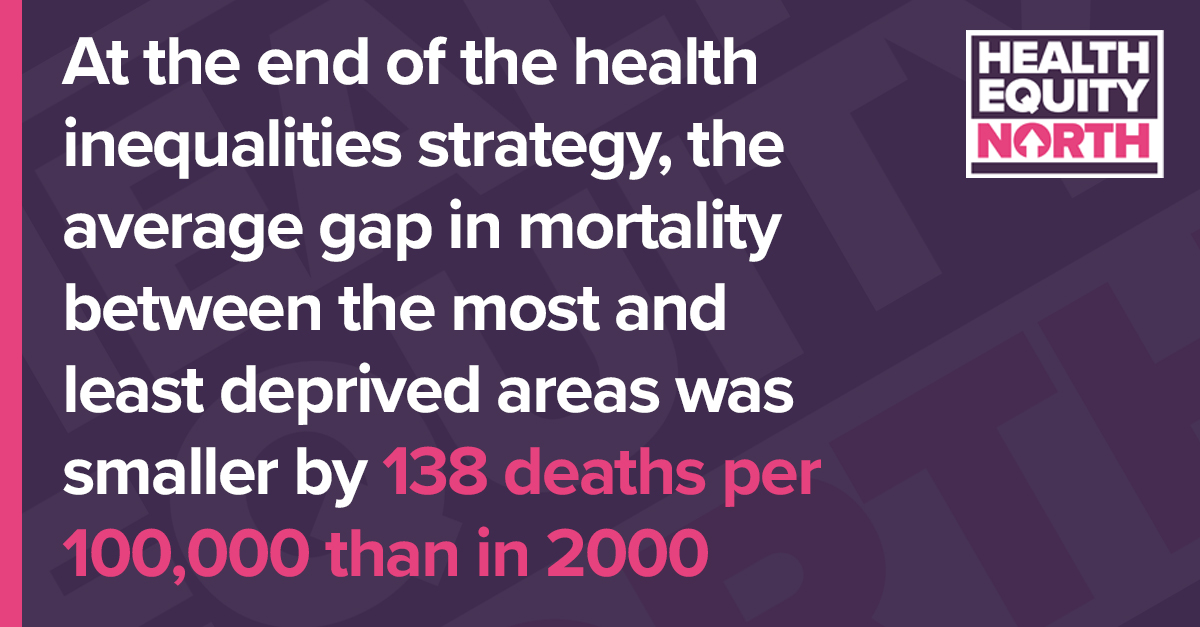Health equity experts urge new Labour Government to adopt health equality strategies to replicate past successes

New analysis has revealed an increase in mortality inequalities in older age groups following the reversal of targeted government strategies to reduce health inequalities in 2010.
Research led by Health Equity North academics, set out to understand the impact of national strategies to narrow health inequalities implemented during the last Labour government with a focus on older people.
The academics assessed trends in mortality rates at the age of 65-69 before, during and after the policy period (1997 – 2010) between the most deprived areas and the rest of England.
The analysis, which has been published in the European Journal of Public Health, suggests that Labour’s English national health inequalities strategy was associated with a decrease in inequalities in mortality for those aged 65–69. However, inequalities significantly increased in the period following the abolition of the strategy.
The new analysis shows that, whilst overall mortality rates have fallen within the last 30 years, there is still a significant gap in the most and the least deprived areas within this age bracket.
The analysis found that, for people aged 65 – 69:
- 1 in 38 people within the age group died in the most deprived areas in 1991. In 2019, this number fell to 1 in 65 people
- 1 in 52 people within the age group died in the least deprived areas in 1991. In 2019, this more than halved, falling to 1 in 105 people.
- The gap equates to 577 more people per 100,000 dying in 2019 in the most deprived areas compared to the least deprived.
- From 2000-2010 (during the health inequalities strategy period), absolute inequalities – which is the difference between the least and most deprived areas – in mortality rates declined consistently:
- At the end of the strategy, the average gap in mortality between the most and least deprived areas was smaller by 138 deaths per 100,000 than in 2000
- However, the period following the strategy (2011–19) was associated with a significant increase in absolute inequalities:
-
- In just one year between 2010 and 2011, the absolute inequality rate in mortality rose by 47 people per 100,000 people aged 65 – 69.
- Compared to 2010, the average gap in mortality between the most and least deprived areas was wider by 66 deaths per 100,000 in 2019.
The English health inequalities strategy implemented by Labour included large increases in public spending on various social programmes, reductions in child and old age poverty rates, the introduction of the national minimum wage, area-based interventions like Health Action Zones, public service agreement targets and a substantial increase in expenditure on the NHS. A cornerstone of Labour’s manifesto was tackling pensioner poverty and providing a ‘decent and secure’ income for pensioners.
The authors of the research say that future efforts to reduce health inequalities among older age groups should prioritise both sufficient income levels and the provision of adequate funding of health and social services, especially in the most deprived areas.
Dr Natalie Bennett, Health Equity North Associate Representative and Postdoctoral Research Associate at the University of Sheffield, wrote the analysis. She said: “The UK continues to have an ageing population[1], with people in more deprived areas experiencing less years in good health. Understandably, this has a direct impact on health and social care provision as well as economic productivity and the social security system.
“It is crucial that, in order to enable older people to live long and healthy lives, policymakers commit to strategies to address health inequalities. This analysis highlights how targeted approaches in the past have had a direct impact on the health of older people, therefore helping to close the health gap between those in the most and least deprived areas of the country.”
Professor Clare Bambra, Health Equity North Academic Co-Director and Professor of Public Health, at Newcastle University, said: “Our research shows that the national health inequalities strategy of the previous Labour government was effective in reducing the health gap between older people. The new government has committed to improve healthy life expectancy for all and halve the gap in healthy life expectancy between different regions of England. To achieve this, they must act quickly and systematically – learning from past successes and the wider public health evidence base”.
Dr Andrew Kingston, Senior Lecturer in the Epidemiology of Ageing at Newcastle University, said: “Our research demonstrates that the past national health inequalities strategy reduced the health gap among older people. To enhance healthy life expectancy and bridge regional disparities, the new government must take immediate and systematic action. The evidence is undeniable: targeted, evidence-based policies can truly make a difference and the time to act is now.”
Hannah Davies, Executive Director of Health Equity North, said: “This analysis clearly shows that implementing targeted strategies can make a real difference to people’s lives. By committing to evidence-based policies to reduce health inequalities, previous governments have seen the positive effects play out in real-life terms. Equally, we can see from this analysis the immediate and significant effect that scrapping these policies had on mortality rates among 65-69-year-olds.
“The new government has an opportunity to learn from past successes when it comes to addressing the health inequalities that persist across the country. The benefits are crystal clear, and we hope that pledges made in the run up to the election to reduce inequalities are upheld.”
Lead author Dr Natalie Bennett was funded by the National Institute for Health and Care Research (NIHR) Applied Research Collaboration (ARC) North East and North Cumbria (NENC) when this research was conducted.
Read the full academic paper in the European Journal of Public Health here: https://academic.oup.com/eurpub/advance-article/doi/10.1093/eurpub/ckae081/7666732?searchresult=1
[1] https://www.healthequitynorth.co.uk/app/uploads/2023/04/HEN-REPORT.pdf






